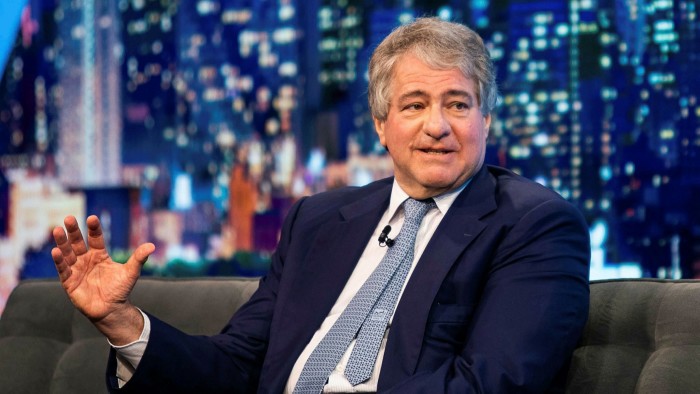Billionaire Leon Black targets New York elite in fight against rape claim

Roula Khalaf, Editor of the FT, selects her favourite stories in this weekly newsletter.
Leon Black, the billionaire financier, is demanding access to private records involving some of New York’s most prominent businessmen as he tries to prove that a lawsuit accusing him of rape is the work of unidentified extortion artists.
Among his targets is Steven Rubenstein, a leading New York public relations executive whose firm’s clients have included Rupert Murdoch, Donald Trump and Apollo Global Management, the private equity firm that Black led until last year.
The fight over phone records represents just one front in an expanding legal battle between Black and his former mistress Guzel Ganieva. The dispute has already drawn in at least half a dozen law firms and threatens to embroil other wealthy figures in the worlds of finance and sport.
“The parties are going at each other with claws,” said Bennett Gershman, a former prosecutor in the New York state anti-corruption office who teaches law at Pace University. “This seems like a particularly vicious lawsuit where the lawyers are looking for leverage, looking for any angle that they can get.”
Rubenstein learned in December that Verizon was poised to hand over details of every call and text message sent to or from his iPhone over a 12-month period. The phone company advised Rubenstein of the impending disclosure after receiving what his lawyers called a “harassing” and “outrageous” subpoena from Black’s legal team.
According to the filings, Black wanted to know about any contact that Rubenstein had with nine named individuals, including reporters who have written about the rape allegations and Ganieva, a Russian fashion model who for several years had a sexual relationship with the married financier.
“Any private citizen should be aghast that [a bystander to a lawsuit] could be made the subject of a subpoena calling for all their telephone records simply at the whim of a litigant,” Rubenstein’s lawyers wrote in a motion to quash the order.
A representative for Rubenstein told the Financial Times: “We have had absolutely no relationship, or contact of any kind, formal or informal, direct or indirect, with the plaintiff in the underlying matter.”
The acrimonious exchange marks an escalation in a legal fight that began in June, shortly after Black resigned from Apollo following revelations about his financial ties to the late paedophile Jeffrey Epstein.
In a civil lawsuit filed in New York that month, Ganieva alleged that Black had sexually abused her for several years and then damaged her reputation by publicly accusing her of extortion after she posted her grievances on Twitter.
Lawyers for Black have branded Ganieva’s entire lawsuit “a work of fiction”, while acknowledging that Black made payments worth millions of dollars to secure Ganieva’s silence about their relationship.
Last autumn, Black supplemented his legal team with Susan Estrich, a feminist legal scholar who shot to national prominence as the manager of Michael Dukakis’s 1988 presidential campaign and later defended former Fox News executive Roger Ailes against claims of sexual harassment.
Estrich promptly filed a federal lawsuit that invoked a statute often used in mafia cases to allege that Ganieva and her lawyers at Wigdor, a high-profile New York firm, were perpetrators of a wide-ranging extortion scheme “to try to get even more from Mr Black — or destroy him in the process”.
The federal lawsuit alleged that Ganieva and Wigdor were the most visible actors in a scheme that also included two “flaks”, or public relations professionals, and a mysterious financial backer with the resources to “go head-to-head with a billionaire”.
Black’s lawyers have not named these alleged co-conspirators in court filings. Among their highest priorities has been finding out who is paying Wigdor’s fees.
According to an engagement letter signed last April and produced in federal court last week, Ganieva agreed to pay Wigdor 38 per cent of any money she received from Black. “There is a possibility that you will recover nothing,” the letter adds, “in which case we will receive no attorneys’ fee from you.”
But in a subpoena served on Wigdor itself in November, Black’s lawyers sought information on any communications or payments between the law firm and several people in Black’s extended orbit.
One person named in that subpoena was Josh Harris, who was among Black’s top lieutenants at Apollo for more than a decade and had hoped to succeed him as chief executive until the men fell out over the Epstein affair.
Another was Michael Rubin, a sports merchandise billionaire who along with Harris is a co-owner of the Philadelphia 76ers basketball team.
“It is completely preposterous that Michael Rubin’s name is even associated with this,” his spokesperson said.
A representative for Harris, who stepped down from Apollo in May, said he “has nothing to do with the situation Mr Black finds himself in or the deeply troubling allegations these lawsuits raise”.
Both men said they had never had any contact or financial dealings with Ganieva or any of her representatives.
In court papers filed last week, Wigdor argued that Black’s allegations were entirely unsubstantiated and asked a court to punish his lawyers for what they said was an abuse of the legal process. “Black, with his billions of dollars, may believe that he can levy baseless and legally defective . . . claims,” the firm wrote. “However, his lawyers should have stepped in and refused.”
But in a letter to Wigdor seen by the FT, Estrich rejected that criticism, stating: “We take issue with your accusation that we failed to investigate or substantiate the allegations of the complaint as it was first filed.”
Comments